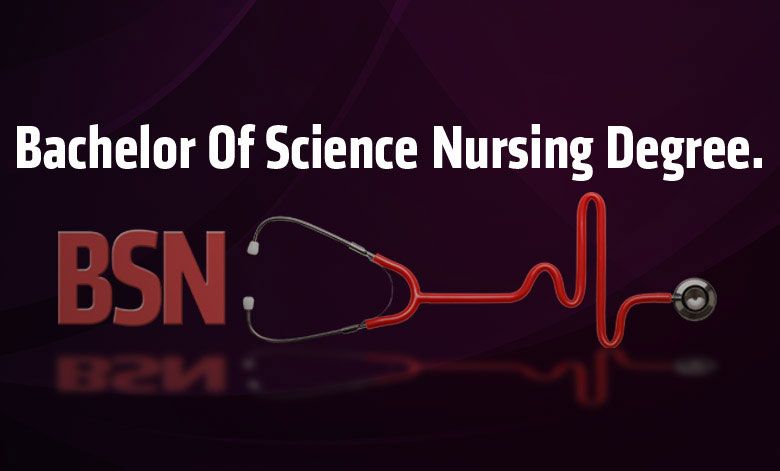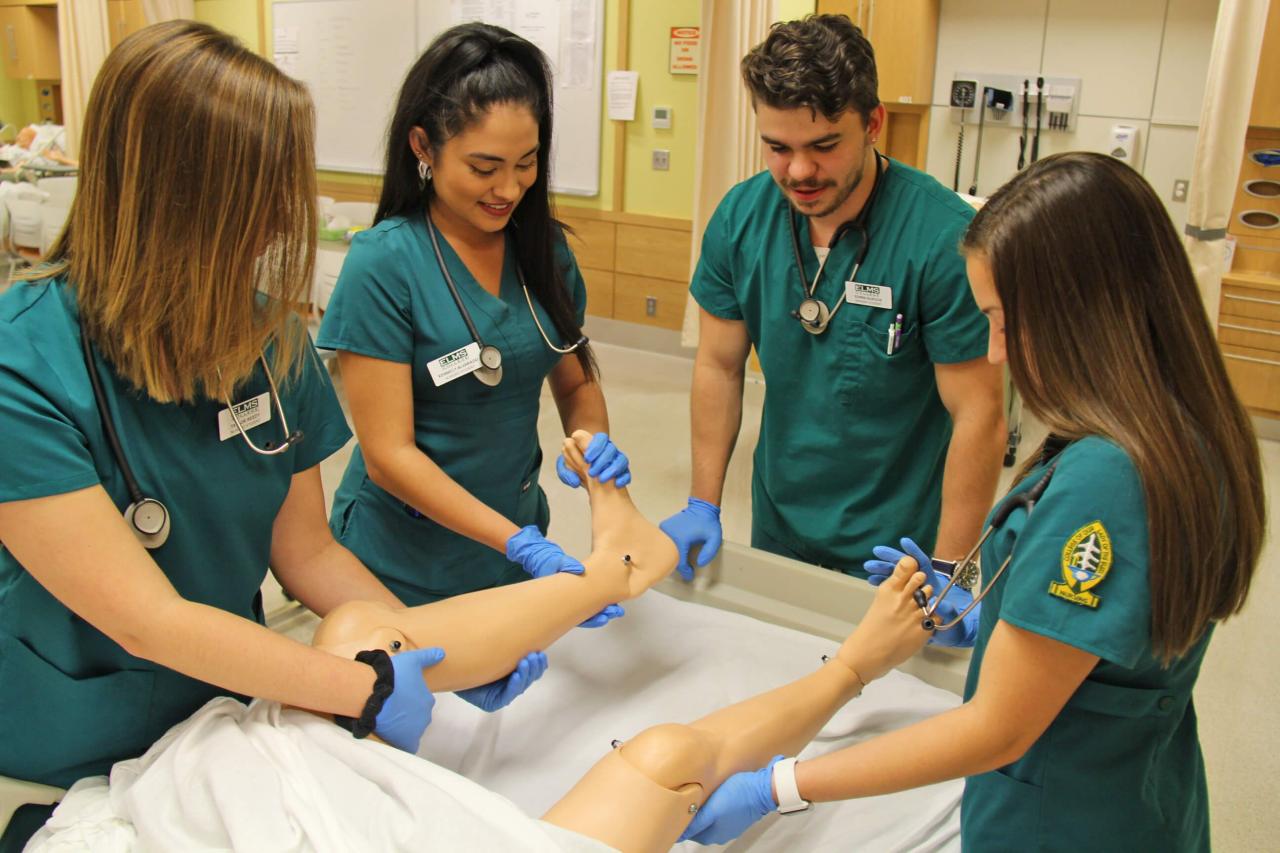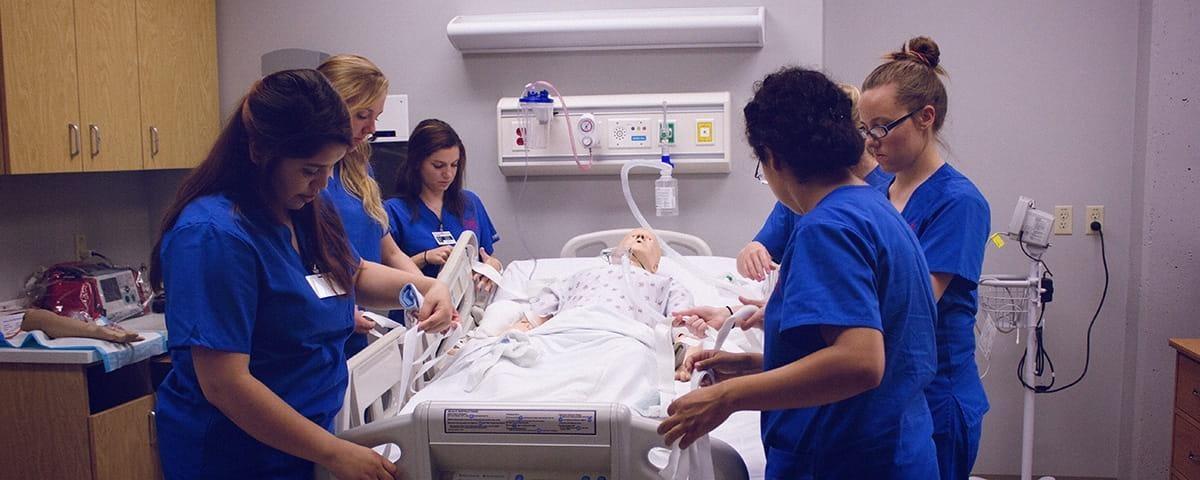
The Bachelor of Science Degree in Nursing (BSN) is a gateway to a rewarding career in healthcare, equipping graduates with the knowledge, skills, and compassion to provide exceptional patient care. This degree program, often spanning four years, delves into the intricacies of human anatomy and physiology, the science of pharmacology, and the fundamental principles of nursing practice. Students gain hands-on experience through clinical rotations in diverse healthcare settings, including hospitals, clinics, and community health centers, honing their skills in patient assessment, medication administration, and therapeutic communication.
A BSN degree opens doors to a wide range of career paths, from bedside care as a registered nurse (RN) to specialized roles in critical care, pediatrics, or geriatrics. Advanced practice registered nurses (APRNs) with a BSN can pursue further education to become nurse practitioners, certified registered nurse anesthetists, or certified nurse midwives, expanding their scope of practice and leadership responsibilities.
Overview of the Bachelor of Science in Nursing (BSN) Degree

A Bachelor of Science in Nursing (BSN) degree is a four-year undergraduate program that prepares students for a career as a registered nurse. The program covers a wide range of topics, from the fundamental principles of nursing to advanced clinical skills.
Core Curriculum
The core curriculum of a BSN program includes essential courses that provide students with a strong foundation in nursing theory and practice. These courses typically cover topics such as:
- Anatomy and Physiology: This course explores the structure and function of the human body, providing students with a comprehensive understanding of how the body works in both health and disease.
- Pharmacology: This course examines the effects of drugs on the body, including their mechanisms of action, indications, side effects, and interactions. It also teaches students how to administer medications safely and effectively.
- Nursing Fundamentals: This course introduces students to the basic principles of nursing, including the nursing process, communication skills, and ethical considerations. It also covers essential nursing skills, such as vital sign assessment, medication administration, and wound care.
- Medical-Surgical Nursing: This course focuses on the care of patients with a wide range of medical and surgical conditions. It covers topics such as cardiovascular disease, diabetes, cancer, and trauma. Students learn to assess patients, develop care plans, and provide comprehensive nursing care.
Clinical Experiences
Clinical experiences are an integral part of a BSN program, providing students with hands-on training in a variety of healthcare settings. These experiences allow students to apply their theoretical knowledge to real-life situations and develop essential clinical skills. Students typically rotate through different departments, such as:
- Medical-Surgical Units: Students gain experience caring for patients with a wide range of medical and surgical conditions.
- Emergency Departments: Students learn to assess and care for patients in emergency situations.
- Intensive Care Units: Students gain experience caring for critically ill patients.
- Operating Rooms: Students learn about surgical procedures and assist with patient care during surgery.
- Labor and Delivery Units: Students gain experience caring for mothers and newborns.
- Pediatric Units: Students learn to care for children with a variety of medical conditions.
- Community Health Settings: Students gain experience providing nursing care in community settings, such as schools, clinics, and home health agencies.
Career Paths
BSN graduates are highly qualified to pursue a variety of career paths in the healthcare field. Some common career paths include:
- Registered Nurse (RN): RNs provide direct patient care, including assessing patients, developing care plans, administering medications, and educating patients and families.
- Nurse Educator: Nurse educators teach nursing students in colleges and universities, preparing them for a career in nursing.
- Nurse Researcher: Nurse researchers conduct research to improve nursing practice and patient care.
- Advanced Practice Registered Nurse (APRN): APRNs are highly skilled nurses who have advanced education and training. They can provide a wide range of services, including diagnosis and treatment of illnesses, prescription of medications, and management of chronic conditions.
Benefits of a BSN Degree
A Bachelor of Science in Nursing (BSN) degree offers a comprehensive and in-depth education, equipping nurses with the knowledge, skills, and critical thinking abilities essential for providing high-quality patient care. Earning a BSN degree opens doors to a wide range of opportunities and advantages, including enhanced job prospects, higher earning potential, and increased professional mobility.
Career Prospects and Earning Potential
The demand for registered nurses (RNs) with a BSN is consistently on the rise, driven by factors such as an aging population, advancements in healthcare technology, and the increasing complexity of patient care. RNs with a BSN generally have a higher earning potential compared to those with an Associate Degree in Nursing (ADN). According to the U.S. Bureau of Labor Statistics, the median annual salary for RNs with a bachelor’s degree was $86,900 in 2022, compared to $75,820 for those with an associate’s degree.
- Increased Job Opportunities: Hospitals and other healthcare facilities often prefer BSN-prepared nurses for leadership roles, advanced practice positions, and specialized areas like critical care and emergency medicine.
- Higher Earning Potential: BSN-prepared nurses generally earn a higher salary than ADN-prepared nurses, with the difference in salary often increasing over time as they progress in their careers.
- Greater Professional Mobility: A BSN degree provides a strong foundation for pursuing advanced nursing roles, such as nurse practitioner, certified registered nurse anesthetist (CRNA), or nurse educator. These roles often require a master’s degree or higher, which can be more easily attained with a BSN as a starting point.
Impact on Patient Care
The BSN curriculum emphasizes evidence-based practice, critical thinking, and leadership skills, all of which are essential for providing high-quality patient care. BSN-prepared nurses are equipped to:
- Utilize Evidence-Based Practice: They are trained to critically evaluate research findings and apply evidence-based guidelines to clinical decision-making, ensuring that patient care is informed by the latest scientific knowledge.
- Apply Critical Thinking Skills: BSN-prepared nurses are adept at analyzing complex situations, identifying potential risks, and developing comprehensive care plans that address individual patient needs.
- Promote Patient Safety: Their advanced education and clinical experience allow them to effectively manage complex patient conditions, minimize risks, and advocate for the safety and well-being of their patients.
Admission Requirements for BSN Programs
Gaining admission to a Bachelor of Science in Nursing (BSN) program requires meeting specific academic and personal qualifications. These requirements ensure that aspiring nurses possess the necessary knowledge, skills, and dedication to excel in their chosen profession.
Academic Prerequisites
To be eligible for a BSN program, prospective students typically need to complete specific prerequisite courses. These courses provide a foundation in fundamental science and humanities subjects, which are essential for understanding nursing concepts and practices.
- Biology: Introductory biology courses cover fundamental biological principles, such as cell structure, genetics, and human anatomy and physiology. These courses provide a basis for understanding human health and disease processes.
- Chemistry: General chemistry courses focus on chemical principles, including atomic structure, chemical bonding, and chemical reactions. This knowledge is essential for understanding the chemical basis of medications and their effects on the body.
- Anatomy and Physiology: These courses delve into the structure and function of the human body. They provide a detailed understanding of organ systems, how they work together, and how they can be affected by disease.
- Microbiology: Microbiology courses explore the world of microorganisms, including bacteria, viruses, and fungi. This knowledge is crucial for understanding infectious diseases and their transmission.
- Psychology: Psychology courses introduce students to the principles of human behavior and mental processes. Understanding human psychology is essential for effective communication and patient care.
- Sociology: Sociology courses examine social structures, interactions, and influences on human behavior. This understanding is crucial for understanding the social determinants of health and providing culturally sensitive care.
- Statistics: Statistics courses teach students how to analyze data, interpret research findings, and make informed decisions based on evidence. This skill is essential for evaluating nursing research and implementing evidence-based practices.
- English Composition: English composition courses emphasize writing skills, including grammar, punctuation, and essay writing. Strong communication skills are essential for clear and concise documentation, patient education, and professional interactions.
GPA Requirements
Most BSN programs have minimum GPA requirements for admission. These requirements vary depending on the specific program and institution, but a GPA of 3.0 or higher is generally considered competitive. A strong academic record demonstrates a student’s ability to handle the rigorous coursework and demanding workload of a nursing program.
Standardized Test Scores
Some BSN programs require applicants to take standardized tests, such as the Test of Essential Academic Skills (TEAS). The TEAS assesses reading, math, science, and English language skills, which are essential for success in nursing school.
Personal Statements
Personal statements are an important part of the application process. They provide an opportunity for applicants to showcase their passion for nursing, their relevant experiences, and their goals for the future. A well-written personal statement should be concise, engaging, and demonstrate a strong understanding of the nursing profession.
Admission Requirements for Prominent Nursing Schools
The following table provides a general overview of admission requirements for several prominent nursing schools:
| Nursing School | Application Deadline | Application Fee | Program Duration | GPA Requirement | Standardized Test | Other Requirements |
|---|---|---|---|---|---|---|
| Johns Hopkins University School of Nursing | January 15 | $85 | 4 years | 3.5 | TEAS | Personal statement, letters of recommendation, volunteer or shadowing experience |
| University of Pennsylvania School of Nursing | January 15 | $80 | 4 years | 3.5 | TEAS | Personal statement, letters of recommendation, volunteer or shadowing experience |
| Yale School of Nursing | January 15 | $85 | 4 years | 3.5 | TEAS | Personal statement, letters of recommendation, volunteer or shadowing experience |
| Columbia University School of Nursing | January 15 | $85 | 4 years | 3.5 | TEAS | Personal statement, letters of recommendation, volunteer or shadowing experience |
| University of California, San Francisco School of Nursing | January 15 | $80 | 4 years | 3.5 | TEAS | Personal statement, letters of recommendation, volunteer or shadowing experience |
Importance of Volunteer or Shadowing Experiences
Volunteer or shadowing experiences in healthcare settings are highly valued by nursing schools. These experiences provide prospective students with firsthand exposure to the realities of the nursing profession, allowing them to:
- Gain Practical Insights: Witnessing real-life patient care situations provides valuable insights into the day-to-day activities and challenges faced by nurses.
- Develop Clinical Skills: Shadowing nurses allows students to observe essential clinical skills, such as patient assessment, medication administration, and communication with patients and families.
- Enhance Empathy and Compassion: Interacting with patients and witnessing their experiences fosters empathy and compassion, essential qualities for successful nurses.
- Confirm Career Choice: Volunteer or shadowing experiences can help prospective students confirm their passion for nursing and ensure that it is the right career path for them.
The Nursing Profession: Bachelor Of Science Degree In Nursing

The nursing profession is constantly evolving, facing new challenges and opportunities as healthcare needs change. Understanding these trends is essential for aspiring nurses to prepare for a rewarding and impactful career.
Trends and Challenges
The nursing profession is experiencing several significant trends and challenges, shaping the future of healthcare delivery. These include:
- Aging Population: As the population ages, the demand for healthcare services, including nursing care, is expected to rise significantly. This trend will require a larger and more skilled nursing workforce to meet the needs of a growing elderly population with complex health conditions.
- Increasing Chronic Disease Burden: Chronic diseases, such as diabetes, heart disease, and cancer, are becoming increasingly prevalent. Nurses play a crucial role in managing chronic conditions, educating patients, and promoting healthy lifestyle choices. This requires specialized knowledge and skills to provide effective care.
- Workforce Shortages: The nursing profession is facing a shortage of qualified professionals, particularly in rural areas and specialty areas. Factors contributing to this shortage include an aging nursing workforce, increasing demand for nurses, and a growing number of nurses leaving the profession due to burnout and stress.
The Evolving Role of Nurses, Bachelor of science degree in nursing
Nurses are taking on expanded roles in healthcare delivery, driven by the increasing complexity of patient care and the need for cost-effective solutions. This evolution is reflected in:
- Specialized Nursing Roles: The demand for specialized nurses in areas like critical care, oncology, mental health, and geriatrics is growing. These nurses possess advanced knowledge and skills to provide specialized care for patients with complex health conditions.
- Increased Patient Advocacy: Nurses are increasingly becoming patient advocates, ensuring patients receive the best possible care and have their voices heard in healthcare decisions. This involves working closely with patients, their families, and other healthcare professionals to create personalized care plans.
- Leadership and Management Roles: Nurses are increasingly assuming leadership and management roles within healthcare organizations. They are responsible for overseeing patient care, developing quality improvement initiatives, and leading teams of nurses and other healthcare professionals.
Technology’s Impact on Nursing Practice
Technological advancements are transforming nursing practice, enhancing efficiency, improving patient outcomes, and expanding access to care. This includes:
- Electronic Health Records (EHRs): EHRs have revolutionized record-keeping and patient care coordination. Nurses use EHRs to access patient information, document care, order medications, and communicate with other healthcare professionals.
- Telehealth: Telehealth allows nurses to provide care remotely, expanding access to healthcare services for patients in underserved areas or with limited mobility. This includes virtual consultations, monitoring, and education.
- Data Analytics: Data analytics tools allow nurses to analyze large datasets to identify trends, improve patient care, and make data-driven decisions. This can help nurses identify patients at risk for complications, optimize care plans, and improve patient outcomes.
The Future of Nursing Education

The landscape of nursing education is constantly evolving, driven by technological advancements, changing healthcare needs, and a growing emphasis on patient-centered care. These trends are shaping the way nurses are trained and prepared for the challenges of the 21st century.
The Integration of Technology in Nursing Education
Technology is playing a transformative role in nursing education, offering innovative ways to enhance learning and clinical skills development.
- Simulation Technology: Virtual reality (VR) and simulation labs provide immersive learning experiences that mimic real-life clinical scenarios. Students can practice procedures, develop critical thinking skills, and make decisions in a safe and controlled environment. For example, VR simulations can help students learn how to respond to a cardiac arrest or manage a patient with a complex medical condition.
- Online Learning Platforms: Online courses, learning management systems (LMS), and mobile applications provide flexible and accessible learning opportunities. Students can access course materials, participate in online discussions, and complete assignments at their own pace, making nursing education more convenient and adaptable to individual schedules.
- Data Analytics and Informatics: Nursing informatics is becoming increasingly important, with nurses using technology to collect, analyze, and interpret patient data. Educational programs are incorporating informatics principles to prepare nurses for data-driven decision-making and the use of electronic health records (EHRs).
Continuing Education and Professional Development
Nurses are required to stay current with the latest advancements in healthcare and nursing practice. Continuing education and professional development are essential throughout their careers.
- Certification Programs: Specialized certifications demonstrate expertise in specific areas of nursing, such as critical care, emergency nursing, or pediatrics. These certifications often require continuing education credits and may enhance career opportunities and salary potential.
- Advanced Degrees: Nurses who wish to pursue leadership roles, research, or specialized practice areas can earn advanced degrees, such as a Master of Science in Nursing (MSN) or a Doctor of Nursing Practice (DNP). These degrees provide in-depth knowledge and skills in advanced nursing practice, research, and leadership.
- Professional Organizations: Professional nursing organizations, such as the American Nurses Association (ANA), offer continuing education programs, conferences, and networking opportunities. These organizations also advocate for nurses and promote professional standards.
Ethical Considerations and Cultural Competency
Ethical considerations and cultural competency are crucial aspects of nursing education. Nurses must be prepared to provide culturally sensitive and ethical care to diverse patient populations.
- Diversity and Inclusion: Nursing education programs are increasingly emphasizing the importance of diversity and inclusion. This includes promoting cultural sensitivity, understanding different perspectives, and addressing health disparities.
- Ethical Decision-Making: Nursing education emphasizes ethical principles, such as beneficence, non-maleficence, autonomy, and justice. Students learn to navigate complex ethical dilemmas and make informed decisions in clinical practice.
- Cultural Competency Training: Nursing schools are incorporating cultural competency training into their curricula. This training helps students develop the skills and knowledge needed to provide culturally appropriate care to patients from diverse backgrounds.
Closing Summary
A BSN degree is a valuable investment for individuals seeking a fulfilling and impactful career in healthcare. The rigorous curriculum, clinical experiences, and professional development opportunities prepare graduates to excel in a dynamic and evolving field. As healthcare continues to advance, nurses with a BSN are poised to lead the way in patient care, research, and education, making a difference in the lives of countless individuals.
FAQ Guide
What are the admission requirements for a BSN program?
Admission requirements vary by program, but typically include a high school diploma or equivalent, a minimum GPA, completion of prerequisite courses (e.g., biology, chemistry), and standardized test scores (e.g., TEAS). Some programs also require personal statements, letters of recommendation, and volunteer or shadowing experiences in healthcare settings.
How long does it take to complete a BSN program?
BSN programs typically take four years to complete, but accelerated programs may be available for students with prior college credits or experience.
What are the job prospects for BSN graduates?
BSN graduates have excellent job prospects, as the demand for registered nurses continues to grow. According to the U.S. Bureau of Labor Statistics, employment of registered nurses is projected to grow 9% from 2020 to 2030, much faster than the average for all occupations.




